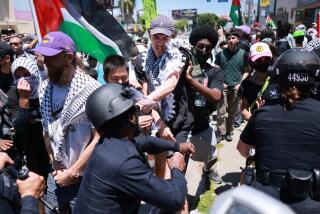Anti-Chinese Riots in Tibet Reportedly Kill 8 : Monk, 3 Officers Among Dead as Protesters in Lhasa Shout for Independence, Witnesses Say
- Share via
HONG KONG — At least eight people died Saturday in bloody anti-Chinese rioting in the Tibetan capital of Lhasa, according to reports reaching here Sunday.
Witnesses in Lhasa said that at least one Buddhist monk, three policemen and four civilians were killed in the daylong rioting, which came on the last day of the Great Prayer Festival, the most important annual religious celebration in Tibet.
A policeman was thrown to his death from a building and two others were stoned and kicked to death by an angry crowd, while the monk and the civilians were shot to death by plainclothes police, the witnesses said.
It was not clear whether more people died later in the day. What sounded like explosions and gunshots could be heard Saturday evening in downtown Lhasa.
The official New China News Agency reported late Sunday that order was returning to the city. The agency confirmed the death of one policeman, Yuan Shisheng. It said that Yuan and another policeman, Yang Yuchen, were stabbed and thrown out of a second-story window. Yang was hospitalized with serious injuries, according to the report, which did not mention other casualties.
The incident began Saturday morning when about 300 young monks in the area of the Jokhang Temple, site of the prayer festival, started shouting slogans calling for Tibetan independence, according to Patrick Lescot, a reporter for Agence France-Presse, who was in the area when the demonstration began.
Tibet, which over the centuries has sometimes been independent and sometimes a part of China, has been firmly controlled by Beijing since 1951. Pro-independence sentiment runs deep among religious Tibetans, who revere the exiled Dalai Lama as their leader, but Beijing views advocacy of Tibetan independence as treason.
The New China News Agency said that the riot was “staged by some separatists.”
Soon after Saturday’s demonstration began, some of the protesting monks and many other Tibetans began throwing stones at police, and at least 3,000 people in the area chanted Tibetan nationalist slogans, according to witnesses.
“Shouting reactionary slogans,” the New China News Agency reported, “rioters attacked a building in the Jokhang Temple, where the Tibetan branch of the Chinese Buddhist Assn. was directing the (Great Prayer Festival) ceremony. Some set fire to a car belonging to the (Buddhist association) branch. Meanwhile, others stormed, looted and set fire to shops and restaurants and beat up policemen sent to maintain order.”
Many Tibetans see the Tibetan branch of the Chinese Buddhist Assn. as an organization that serves Beijing’s interests and opposes the idea of Tibetan independence.
The Chinese news agency also reported that rioters attacked a police station near the Jokhang Temple.
Monks on Temple Roof
About 10 truckloads of police arrived within half an hour after the demonstration began, but they were unable to control the situation. Monks climbed onto the roof of the Jokhang Temple and continued to throw stones. Some Chinese television journalists were injured and several vehicles, including an official limousine, were damaged or set on fire, according to witnesses in a report by the China News Service, another official Chinese news agency.
Police using tear gas stormed the temple shortly before noon. Witnesses said a fire broke out in the building, and about 100 monks were arrested and taken away in police trucks.
Several thousand Tibetans continued to confront police for hours Saturday afternoon in the streets surrounding the temple, according to a Tibetan who spoke with a Westerner in Lhasa.
Official Chinese newspapers carried brief reports Sunday morning on the rioting but did not give casualty figures. The official Workers’ Daily ran a page-one picture of a helmeted police officer using a fire extinguisher on an overturned, burning car.
Similar Clash in October
The rioting was the first anti-Chinese violence reported in Tibet since last Oct. 1, when a similar incident ended with an estimated 6 to 14 people dead. Chinese officials, after originally denying that police opened fire in that incident, have recently acknowledged that shots were fired and some people died of gunshot wounds.
The entire Great Prayer Festival took place in an atmosphere of tension. Hundreds of monks--angry at Chinese control of Tibet and at what they saw as an attempt by China to use the festival to propagate an image of religious freedom in Tibet--boycotted the celebration.
About 1,000 monks and at least 5,000 worshipers, however, participated in Thursday evening’s festival high point, when large sculptures made of colored yak butter and hundreds of yak-butter lamps were set up outside the Jokhang Temple. That evening’s activities took place under tight security and crowd-control measures by about 1,000 uniformed police and what appeared to be an equal number of plainclothes officers. It ended without serious incident.
Friday, as the festival seemed headed toward a quiet close, government officials in Lhasa appeared confident that they had achieved their goal of holding the celebration without major disturbances.
Telephones Cut Off
Telephone and telex communications into and out of Lhasa were cut off about 30 minutes after Saturday’s incidents began and remained cut on Sunday. French agency correspondent Lescot, the last Western journalist to leave the city, was confined to his hotel Saturday afternoon and evening and was ordered to leave Tibet on Sunday.
The New China News Agency report indicated that a more severe crackdown against advocates of Tibetan independence may result from the riot.
The agency charged that “local religious leaders”--an apparent reference to officials of the Tibetan branch of the Chinese Buddhist Assn.--”demand justice against the rioters.”
David Holley, chief of The Times’ bureau in Beijing, has just finished a visit to Lhasa.
More to Read
Sign up for Essential California
The most important California stories and recommendations in your inbox every morning.
You may occasionally receive promotional content from the Los Angeles Times.













